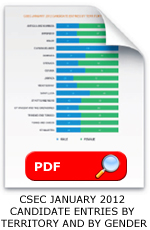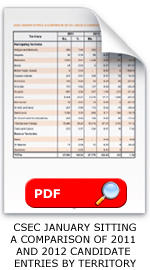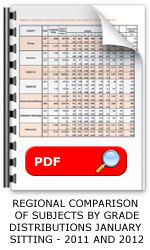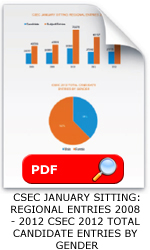![]()
![]()
![]()
Administration of the ExaminationThirteen subjects were offered for the January sitting this year. Performance of CandidatesForty-five per cent of entries achieved acceptable grades, compared with 49 per cent last year. BIOLOGYForty-four per cent of the candidates achieved Grades I–III, compared with 56 per cent in 2011. Candidate performance declined on the three papers, Paper 01, the Multiple Choice paper, Paper 02, the Structured Essay paper and Paper 032, the Alternative to the School Based Assessment. The Examining Committee noted that candidates appeared to be unfamiliar with biological concepts related to digestion, respiration, photosynthesis and ecology. CHEMISTRYTwenty-four per cent of the candidates achieved Grades I–III, compared with 31 per cent in 2011 and 41 per cent in 2010. Although there was evidence of excellent responses to all questions, there was a significant number of candidates who exhibited a high level of unpreparedness for the examination. Some improvement was noted in candidates’ ability to read scales of the instruments drawn, and in plotting points accurately given the axes. However, candidates exhibited weaknesses in the depth of their responses, in defining and discriminating among concepts, and in writing and balancing equations (molecular and ionic). Too many candidates demonstrated unfamiliarity with common, practical procedures, such as, testing for gases and identifying reducing and oxidizing agents. Candidates’ unfamiliarity with laboratory exercises was very apparent based on their responses to Paper 032, the Alternative to the School Based Assessment. ENGLISH APerformance in English A was moderate in January 2012. Forty-three per cent of candidates achieved Grades I–III. This was a decline from January 2011 when the percentage of candidates who achieved this level was 54 per cent. Declining performance was most evident on Profile 1, Understanding. There was a marked decline in the quality of response on Paper 02, Question 2, the narrative comprehension. Weak performance was also noted on Question 4, the short story based on a picture stimulus. ENGLISH BEnglish B was offered for the second time for the January sitting of CSEC examinations this year. Approximately 806 candidates wrote the examination compared with 821 last year. Performance at the Grades I–III level experienced a sharp decline from approximately 61 per cent in 2011 down to 32 per cent in 2012. Performance on the January 2012 examination was affected by the number of candidates who seemed to have prepared the texts which will be examined for the first time in May-June 2012, believing that these texts would have in fact been examined in January 2012. However, the January 2012 examination was the last for the cycle of texts which began in 2009. The candidates who had prepared the texts for the June examination would not have been able to respond to the drama questions which were set on specific texts. While performance on all three profiles — Drama, Poetry and Prose Fiction — declined, the greatest decline was on the Drama profile. HUMAN AND SOCIAL BIOLOGYThirty-two per cent of the candidates achieved Grades I–III, compared with 51 per cent in 2011. Performance remained steady on Paper 01, the Multiple Choice paper. However, performance declined on Paper 02, the Structured Essay paper. Candidates had difficulties responding to questions bases on reproduction, homeostasis and the human kidney. INFORMATION TECHNOLOGYThe January 2012 examination was the second January examination based on the revised syllabus. While there was a decline in performance on Profile 1, Theory, and Profile 2, Productivity Tools, compared with 2011, performance on Profile 3, Problem Solving and Programming showed marked improvement. This improved performance notwithstanding, candidates’ main areas of weakness continue to be problem solving and programming in PASCAL, writing fragments of code in PASCAL and analyzing a PASCAL program. MATHEMATICSForty per cent of the candidates who wrote the January 2012 examination achieved Grades I–III compared with 37 per cent in January 2011. While there was an improved performance on Paper 02, the Extended Response paper, the performance on Paper 01, the Multiple Choice paper remained consistent with that of January 2011. Candidates experienced challenges in both the Compulsory and Optional Sections of Paper 02 with questions which tested Algebra and Geometry. OFFICE ADMINISTRATIONCandidates’ performance improved significantly over that of 2011. Eight-eight per cent of the candidates achieved Grades I–III compared with 71 per cent in 2011. The improvement was primarily due to an improved performance on Paper 02, the Extended Response paper. Whereas the performance on Paper 01 was consistent, there was a decline in candidates’ performance on Paper 032, the Alternative to the School Based Assessment, when compared with that of 2011. PRINCIPLES OF ACCOUNTSSixty-two per cent of the candidates achieved Grades I–III compared with 37 per cent in January 2011 and 46 per cent in 2010. There were improvements in the performance on the three components of the examination - Paper 01, the Multiple choice paper, Paper 02, the Essay paper and Paper 032, the Alternative to the School Based Assessment. There was improved performance on the three profiles — Knowledge, Application and Interpretation. PRINCIPLES OF BUSINESSSeventy-one per cent of the candidates achieved Grades I-III compared with 63 per cent in January 2011 and 49 per cent in 2010. Performance on Paper 01, the Multiple Choice paper, was consistent with that of 2011 and 2010. However, there were improvements on Paper 02, the Essay paper and Paper 032, the Alternative to the School Based Assessment. There was marked improvement on Profile 3, The Business Environment. PHYSICSOne thousand two hundred and twenty-five candidates wrote the January 2012 examination compared with 1063 in 2011. There was an improvement in the overall performance of candidates on this year’s examination. The percentage of candidates earning Grades I–III was 53 per cent compared with 49 per cent in 2011. The mathematical skill of “changing the subject of the formula” is one area in which candidates require more practice. SOCIAL STUDIESFifty per cent of the candidates achieved Grades I–III in the January 2012 examination compared with 70 per cent in 2011. This decline in performance was evident across both Profile 1, Knowledge and Comprehension, and Profile 2, Application, Evaluation and Problem Solving, as well as on Paper 01, the Multiple Choice paper, and 02, the Essay paper. The performance on Paper 032, the Alternative to the School Based Assessment, was consistent with that of 2012. Candidates’ continued to display weakness in providing detailed explanations and examples for questions which explicitly required them to do so. SPANISHSixty-nine per cent of the candidates achieved Grades I–III compared with 60 per cent in January 2011. There was improved candidates’ performance at the upper levels on the three papers — Paper 01, the Multiple Choice paper, which assesses the listening and reading skills, Paper 02, the Free Response paper, which assesses candidates’ ability to write the language, and Paper 03, the Oral paper, which assesses the listening and speaking. The Reading and Writing profiles continue to pose the greatest challenge to candidates. It is recommended that teachers and students of Spanish continue (i) the practice of doing Reading Comprehension exercises, (ii) reading Spanish in general, which helps to improve pronunciation, (iii) listening to native speakers of Spanish, (iv) the practice of oral exercises. |





